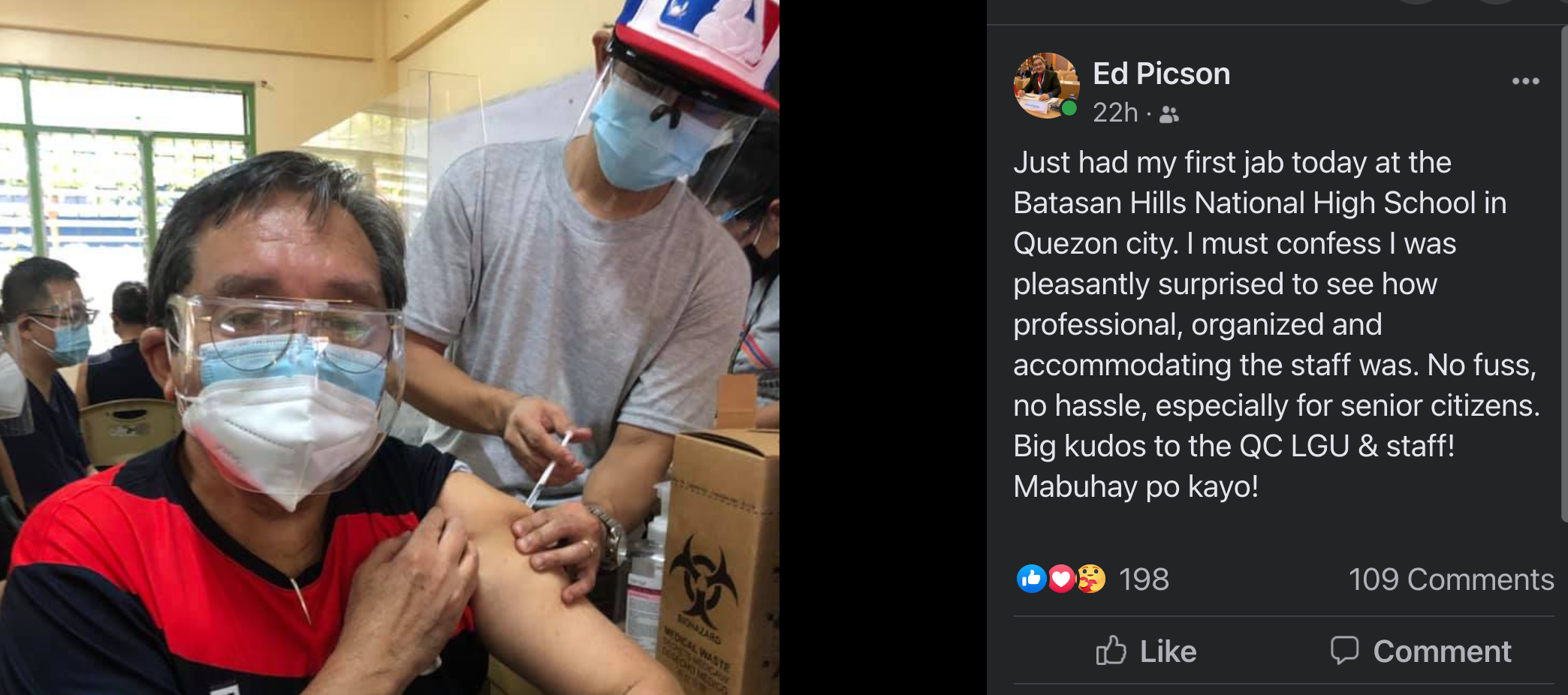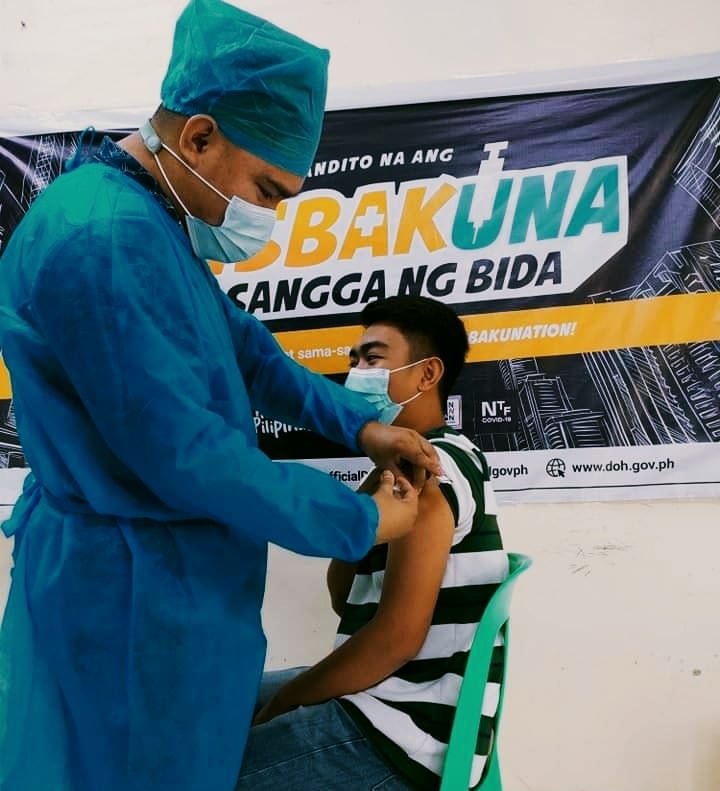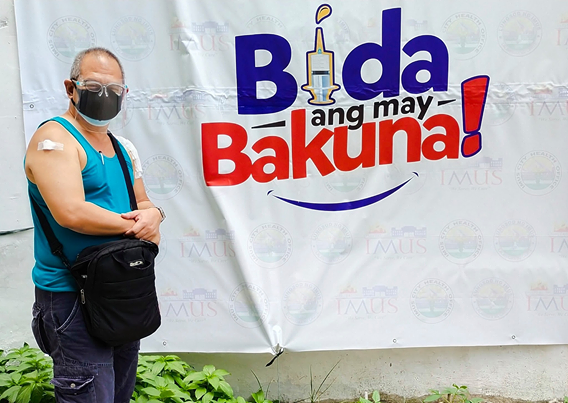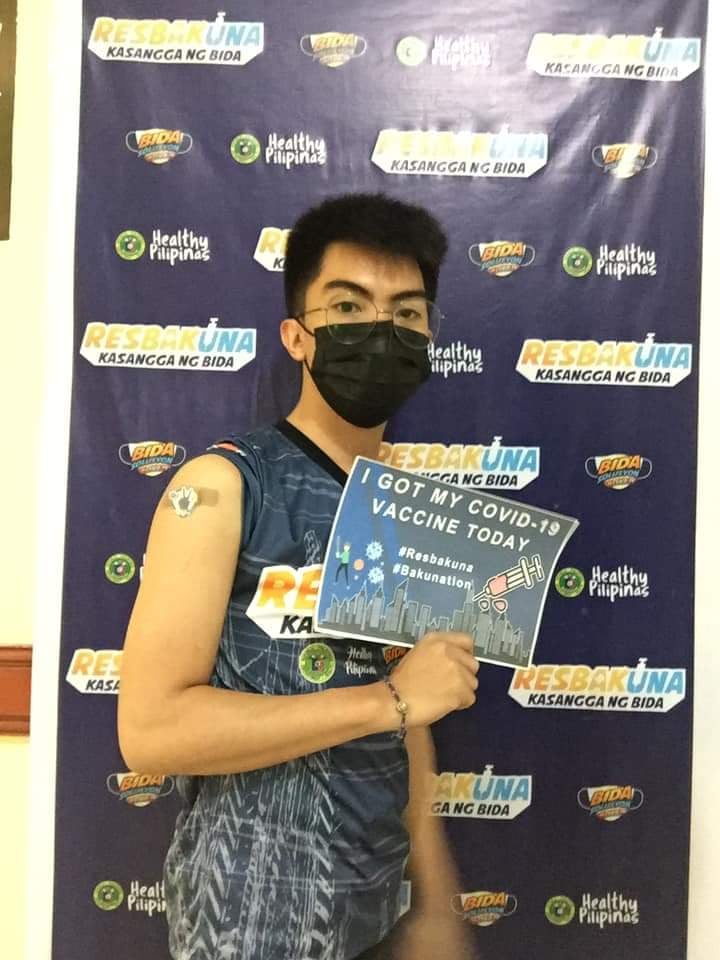By Alec Go
A year after the Coronavirus disease transmission was confirmed in the Philippines, the government began its rollout of COVID-19 vaccines as an added protection to vulnerable sectors of the population.
Experts have repeatedly emphasized that vaccines currently being used in the country under emergency use approval such as those developed by Sinovac Biotech of China and the British-Swedish-made AstraZeneca are safe and effective amid growing hesitancy among the public.
Dr. Edsel Salvana, an infectious disease specialist and Director of the Institute of Molecular Biology and Biotechnology of the University of Philippine National Institutes of Health (UP-NIH), said CoronaVac is highly efficacious in preventing severe COVID-19 despite its reported 50% efficacy in some trials.
PTV talked to some vaccine beneficiaries to determine exactly why they took the shot.
Zareth, 42, administrative assistant, Caloocan
Vaccine: Sinovac, administered on April 5, next dose on May 5
Zareth said she was at first reluctant to do it due to fears of side effects and because she has comorbidities. She eventually gave in because she “wanted to be protected” and “wanted to feel safe.”
With no adverse effects experienced and with the protection given by the shot, she is now calling on other people to do it, too.
“[It is] for them to be protected and be somehow safe from the virus. Taking the vaccine is risky, but with faith in God and praying that there will be no side effects, I bravely took it.”
Ed, 67, SecGen, Association of Boxing Alliances in the Philippines
Vaccine: Sinovac, administered on April 9

As a senior citizen, Mr. Ed Picson said he got vaccinated without having second thoughts “for protection against COVID.” No side effects were felt hours after injection, not even soreness of the injection site.
“Maybe it’s best to take the day off after your second dose if you experience discomfort after your first,” he advised.
“The virus is treacherous. We need to find ways to mitigate the possibility of getting infected by it. Medical experts agree vaccination is the best way. I trust their word,” he affirmed.
Asked if he would encourage other people to get the jab, he answered firmly on the affirmative.
“Absolutely. We need to do everything to fight this malady. Face masks, safe distancing, good hygiene, everything. It just makes sense!” he stressed.
Peter, 55, sportswriter, Manila Standard
Vaccine: Sinovac, administered on April 10
Mr. Atencio felt the urgency to do it and to immediately “find ways to make things possible to have social contact with people” he primarily interacts with.
“No second thoughts because the side effects on any person affected are being put under study and evaluation by medical experts the moment they happen,” he said, adding that he trusts experts’ call “in the need to develop herd immunity.”
He narrated that there was an “acidic or metallic” aftertaste of his burps after lunch following his vaccination which lasted for a few moments.
Mark, 23, hospital computer maintenance technologist, Apayao
Vaccine: Sinovac, administered on March 11 and April 8

In the case of Mark who is now fully vaccinated versus the disease, he only felt frequent sleepiness and mild headache within the first week after receiving the vaccine.
For him, this is nothing compared to the protection it would give to people around him, especially those vulnerable to the disease like the elderly.
“Tulungan natin ang mga frontliners na silang nagsasakripisyo sa pandemyang ito, maging madisiplina sumunod sa mga utos ng gobyerno lalo na kung hindi kapa nakapagpabakuna (Let us help our frontliners who are sacrificing in this pandemic. Be disciplined and comply with government protocols, more so if you haven’t been vaccinated yet),” he urged.
Alex, 22, medical student, Manila
Vaccine: AstraZeneca, administered on March 26, next dose on May 21
Alex had her first dose at the Ospital ng Maynila in preparation for her incoming clerkship. She experienced low grade fever, chills, and fatigue in less than a day.
She did not hesitate to be inoculated, saying “efficacy does not matter if it can prevent the disease from getting severe or worse, cause death.”
“As of now, it is the only solution,” she added.
Vic, 53, professor, Imus
Vaccine: Sinovac, administered on April 9

“Me and my family were determined to get vaccinated. Although at first, we were hesitant about the brand to be used because of the news (both real and fake) that went around,” Prof. Vic shared.
“It was only when a friend told me that vaccination under category A3 by the local government had already begun, we rushed to the vaccination site and immediately had ourselves injected. The formal registration until the issuance of the vaccine card took more or less four hours,” he added.
As for side effects, he said he “only got sleepy” following the injection of the first dose which was gone after resting.
Still, he recommends getting vaccinated “because it is the only way to fight the virus.”
Lamlam, 22, medical technologist, Apayao
Vaccine: Sinovac, administered on April 8, next dose after 28 days

Lam willingly took the shot in a bid to “strengthen immunity against COVID” and wants others to have the same mindset to get protected and because “it’s free.”
He only had pain on the injection site within a few hours, tolerable headache, and sleepiness.
“I studied the mode and action of the drug. I found out how mild the side effects were which are normal reactions you get from any ordinary vaccine. It’s best if we consult reliable sources than to listen to hearsay which is misleading,” he advised.
Kriz, 29, dentist, Laguna
Vaccine: AstraZeneca, administered on March 10, next dose on May 15*
Similar to other health frontliners, Kriz said taking the vaccine is for the protection of everybody considering their daily exposure to aerosols and droplets of patients.
She got an elevated temperature and pain on the injection site that worsened for the next five days. She was prescribed Cloxacillin taken four times daily for seven days. Her condition improved on the third day of antibiotic therapy.
“Three weeks post vaccination, I still have a hard lump on the injection site. I consulted my friend doctor about it and (I was) told that it was post injection fibrosis and is expected to happen based on my previous reaction and that I have nothing to worry about,” she continued.
Despite the side effects, Kriz is still inclined to encourage the public to be administered with a COVID-19 vaccine.
“It will help us end this pandemic by achieving herd immunity through being vaccinated. I am hoping that because vaccine rollouts have started, our cases would start to drop, of course, with the cooperation of every one of us, that is, following the basic health protocols.”
Daphne Oseña-Paez
In a Facebook post, TV host and Unicef Goodwill Ambassador Daphne Oseña-Paez shared she got inoculated under Priority List A3 on April 7 in Parañaque City.
“In the interest of encouraging everyone to sign up for the COVID vaccine, I am posting now. If you have controlled comorbidities please sign up and get vaccinated. If you know seniors in your community, encourage and help them sign up,” she urged.
“Trust the science, the system, the plan,” she added.
It’s been two days since I got my COVID-19 vaccine, under the A3 list of Parañaque. I feel great. No felt or visible…
Posted by Daphne Osena Paez on Thursday, April 8, 2021
The United States Centers for Disease Control and Prevention (CDC) cited that the side effects of the vaccine are pain in the vaccination site, fever, headache, muscle pain, and nausea which could go away in a few days.
With the emergence of anti-vaxxers mostly composed of individuals without any expertise on infectious diseases, medical practitioners are now calling on the public to grab the chance and take the jab to improve the current state of affairs.
The World Health Organization (WHO) has repeatedly explained that vaccines are safe after undergoing “rigorous, multi-stage testing processes, including large (phase III) trials that involve tens of thousands of people” including highly vulnerable individuals.
Latest report from Bloomberg shows that more than 726 million doses have been administered worldwide. The Philippines has administered 922,898 doses with 50,685 fully vaccinated people.
